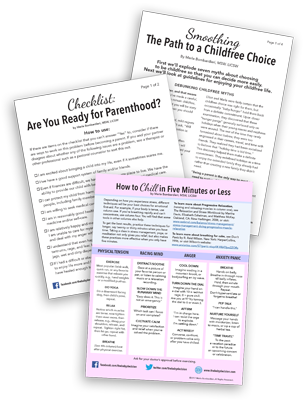
(updated December 2024)
Holidays and other times spent with family or in-laws needn’t fill you with dread — here Merle offers tips and advice on how to avoid or handle questions or comments about your baby or parenthood plans, and other sensitive personal topics.
..
by Merle Bombardieri
:
Even as a grown-up, you may still have a child’s expectation that the holidays will be fun: family meals, gift exchanges, laugh-filled reunions. The reality for many people is that the holiday season, or at least parts of it, can be difficult. This Is especially true when you are engaged in the decision-making process.
But even if you weren’t struggling with decision-making, the weeks “celebrating” the holidays might bring some disappointment as well. Whatever aspects of family members and friends’ personalities have bothered you in the past, could potentially dampen things even further when you are feeling vulnerable.
And when you add in the stresses of parenthood decision-making — especially if you and your partner aren’t on the same page — you may face even greater challenges during holidays. This is especially difficult if your parents or other family have pressured you on the subject in recent conversations. There will be an additional layer of tension and stress.
..
Strategic advice for enjoying the holidays:
.
1. Cut conversations short or prevent them in the first place if you can.
One thing you can do is prepare people ahead of time by setting clear boundaries about your non-negotiables. You might speak to your mother, for instance, before you travel:
“Please don’t bring up kids while we are there for the holidays. We are not looking for input and especially not in group discussions over dinner.”
Also consider enlisting support from other family members, especially if you believe they might have better luck than you in asking someone not to bring up the topic:
Dad, you know Aunt Doris always brings up kids. Could you ask her in advance to not do that this time?”
If the topic comes up in the middle of dinner or when the whole clan is gathered around the fire, consider one of the following:
“I/we appreciate your concern, but we aren’t interested in talking about this.”
“That pie looks great. Could you cut me a piece?”
“Who do you think will win the Rose Bowl?”
“Where are you going for winter vacation?”
You can also use humor:
“You’ll be the first to know. We’ll let you know when we do.”
Or hint at fertility issues: “Not in the cards for us.”
If people persist you can say:
“We told you we’re not talking about this. Please respect our wishes.” And you might add: “I/we don’t feel like talking about such personal issues in this setting. I will reach out if this is something I’d like to discuss with you more privately. And if the conversation persists, you might even leave the room.”
You might consider role-playing at home with your partner or a friend to get some practice ahead of the visit.
2. Control Information! Whatever you reveal, you can’t unsay or erase!
If you are in the middle of sorting things out, it’s probably too early to bring this up, even privately. Especially if you and your partner are not on the same page, revealing this fact may lead to family taking sides, seeing their non-relative as the enemy, and trying to shape your decision. Focusing on your boundaries and discomfort may help to shut the conversation down. For example, you can say: “When you bring up this topic, I feel uncomfortable. Let’s change the subject.”
If you do want to talk to someone, keep the conversation private.
What if you want input from someone you will see during the holidays? First decide if you can trust them to keep a secret. Ask them for reassurance about this.
Then arrange to talk to them, in a quiet place at an arranged time, perhaps during a walk or when other guests are out of the house. Let them know what you’d like from them. Maybe you’d like to sit down with your brother and sister-in-law, parents of a 3 and a 5-year-old (while someone else is watching their kids) and say:
“We’re thinking of having a child. We trust your judgment and like the way you interact with your kids. Do you have any advice for us? Is it easy to imagine us as happy parents?”
3. Find ways to have fun. Try to focus on talking to the people you like the most. Talk to them about interests you have in common. Find enjoyable activities to do such as a winter hike or cross-country skiing with cousins, or a drive to see decorations in a nearby town. Or if you’re going to be visiting family for several days, take a day trip to a favorite spot — just the two of you — or a new place that intrigues you.
4. Set modest goals. Don’t expect things to be blissful. Go for the experience of some fun, enjoying some people and some good moments of joy when you can. That way you can savor the good times when they occur and be more accepting of the less pleasant moments.
..
Psychological advice for enjoying the holidays:
.
1. Revel in the new opportunities coming in the New Year. What are your best hopes for yourself and your partner in decision-making for the new year? Or if you’re pregnant or adopting, or trying for a pregnancy, what activities will you do next? Or how are you going to plan for what’s next if you’ve decided to be childfree? What podcasts will you listen to, what books will you read, what support communities will you join? Are there professional coaches, psychotherapists, or medical professionals that you will seek out?
2. Watch out for efforts to win your partner to your side if you’re not on the same page. Maybe your partner leans childfree, but you are sure he will melt and change his mind if he holds your three-month-old niece. This could easily backfire. That niece could scream for hours or leave your partner cold. Or maybe you’re learning childfree and you’re hoping that your childfree best couple friends’ tales of adventure travels will make your partner forget how much he hopes you’ll be pregnant by next December.
While learning more about others’ lives as parents or childfree people could lead to new insights or good conversations about your decision, you can’t count on this, and you’ll probably enjoy the holidays more if you don’t have an agenda. You can get back to the decision conversation later. Taking a break may help you come back to the table with fresh ideas.
3. Be kind to yourself about timelines and other stressors. Maybe last December you assumed that by this year, you would be pregnant under the mistletoe or have confidently announced your childfree plans. Or you’re single and recently broke up with the partner you hoped to parent with. You might be pregnant after infertility but told that you might miscarry. Or maybe you’re just beginning to accept the fact that you agreed to be childfree for the sake of your partner. This season of celebration may feel out of sync with your disappointing reality.
Consider putting together an emergency holiday self-care toolkit. You could write yourself a cheat sheet of ways to feel better such as listening to music or going for a walk. Or you could create an actual gift basket or bag packed with a journal, a candle, a pack of hot cocoa or favorite snacks that you (and your partner) can enjoy.
..
What has worked for you?
.
Are there any strategies that have worked for you for avoiding or managing such conversations? Tell me what’s worked or not worked for you in the comments below, or in our Facebook group called “The Decision Café” — or on my growing Instagram page!
You can find more helpful posts from me and other contributors on my blog page and in my bi-monthly email newsletter. The newsletter features exclusive content that you won’t find anywhere else, including excerpts from my new forthcoming book! If you aren’t subscribed yet, stay in touch and quickly sign up here or in the pop-up box below.
You can contact me on social media, or use the comments section here, or send an email using my online contact form.
Photo on this page by Kelsey Chance on Unsplash.com

